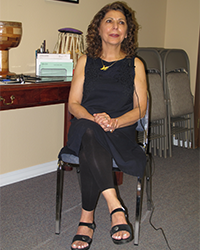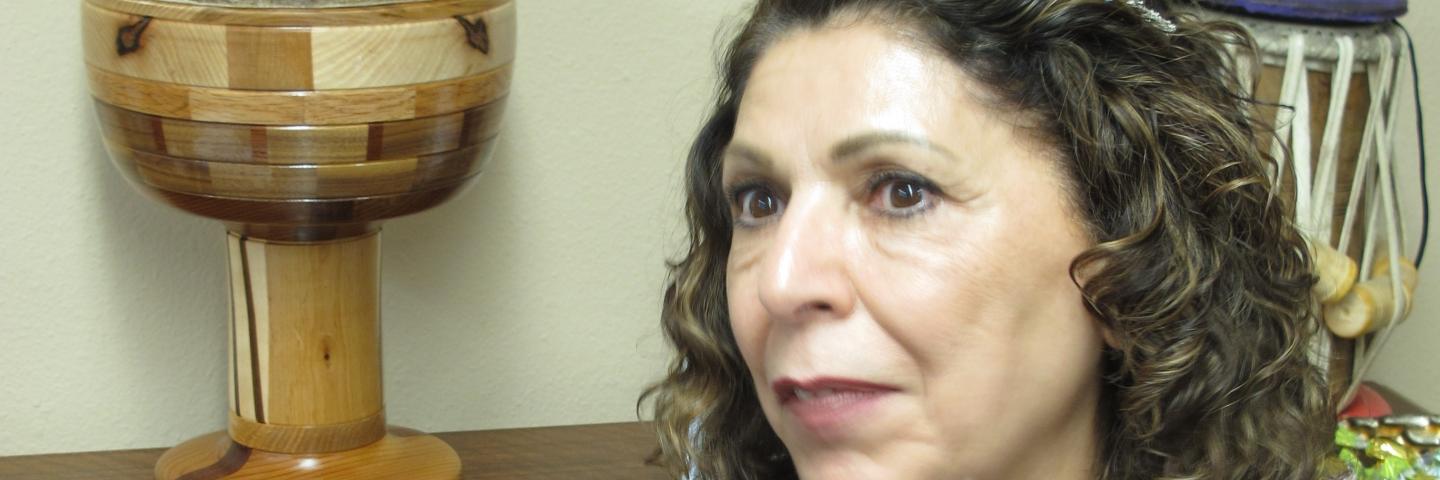 | Traditional Skill/Art Craft: Persian Storytelling and Poetry Recitation Years Awarded: 2017 Contact Information: Phone: (503)579-3431 Email: azar.salehi@comcast.net |
ARTIST BIOGRAPHY
I was born to a traditional family in Tehran, Iran. In 1988 along with my husband and two children we migrated to Oregon and from early days I volunteered along with my family to practice and celebrate our traditional values and share them with Oregonians. In 1990 Portland State University Middle Eastern Studies program invited me to set the traditional tables and educate visitors about different exhibitions that I learned from my parents, family, and schools. I began teaching Nowruz (New Year) tradition to my students at PSU’s Persia House in 1992 when I was on the Board of Iranian Women Association of Oregon. First year with my students (about 25) and then with the whole Persia House school (85 students). I taught Farsi and continued collaborating with other community members to educate children with Iranian culture through storytelling, costume making, and celebrating Nowruz by growing wheat sprouts and setting New Year table. It’s heart-warming to know that tradition is still being practiced by current staff. Since 2000 I have been an organizer, advocate and volunteer at the annual Iranian Festival, running the Children’s Tent, and for twenty years now, I volunteer to recite Persian Poetry and relate stories at Iran-e Man TV.
APPRENTICE BIOGRAPHY - Mahsa Darabi 2017
Mahsa Darabi is an Iranian/American woman who moved to Oregon with her family at the age of 7 to be with the rest of her family that had migrated here. Her fondest memories as a child were when her father would gather up all the children and regal them with traditional stories of their ancient culture. These stories told by her father were her first introductions to Iranian storytelling, but it was after moving to the U.S. and meeting Salehi that she was able to be a part of a community here in Oregon and reconnect with her culture. Darabi had worked with Salehi before, where she and her sister were able to do their own storytelling on the radio and perform in many plays directed by Salehi. It is her goal to be able to pass on the tradition to her children as a way to connect them back to their culture and history, she also hopes to be able to pass these traditional stories on during local community events for the younger generations to become exposed to it.
Q+A WITH THE MENTOR ARTIST
Describe your traditional art.
Body
For most Persian, both in Iran and abroad, poetry recitation and storytelling are traditions that are practiced as much in day-to-day lives as during monumental events. The average Persian household typically includes a copy of the collective works of Hafez (Divan-e-Hafez) which is often used as an oracle for direction during times of uncertainty. Similarly, verses from the book are read during Norouz, the Persian new year, and sometimes even during weddings. This is done irrespective of religion or faith; it is a universally accepted and celebrated form of spiritual guidance.
I first became interested in poetry recitation as a young child through my encounters with the oral tradition at my aunt's school of the arts. By middle school I was actively involved in school plays and an avid story teller and by high school I was directing school plays and teaching my peers about proper enunciation and the importance of injecting the spirit into the spoken word.
How did you come to learn this tradition?
Body
Growing up in Iran, my aunt operated a school of arts where I spent a lot of time, mostly as a silent observer. The school provided lessons in everything from literature to ceramics and pottery. These classes, which consisted of only women during those days, were far more than just learning an artistic craft. They were social mixers and a breeding ground for folklore and stories that were passed down through generations. The women who attended the classes were there as much for the tribal communion as for the skills acquired during class. At a young age I found myself drawn to this communal exchange of information. I fell in love with stories and the spoken word and this passion only gained momentum over the years.
Why is this cultural tradition important to your community?
Body
Persian (Iranian) culture is deeply steeped in poetry and storytelling. Whether it's invoking Rumi for spiritual guidance, calling on Hafez as an oracle, or referencing the tragedy of Shirin and Farhad as the apogee of true love, the Iranian diaspora relies heavily on the oral tradition as an atlas to retrace old roots and the thread with which to weave the fabric of future generations.
Experience/Honors
Body
The first valuable certificate of recognition I received from Queen of Iran where I won first place in Poetry Reciting (1970). I received several certificates followed by that as an active member of cultural values.
In 1992 I wrote and narrated a story; the performance at Portland State University was well received and was repeated by popular demand at Reed College and Scottish Rite.
In 1995 I was selected as president of Iranian Womens Association of Oregon and served on the Board of Directors for 5 years, volunteering to pass on the Persian language to my next generation.
I received a letter of appreciation from Persia House, ArtMax Academy.
Visit OFN's Culture Keepers Roster to learn more about the artist.
Traditional Arts Apprenticeship Program
More OFN programs
OFN main page
